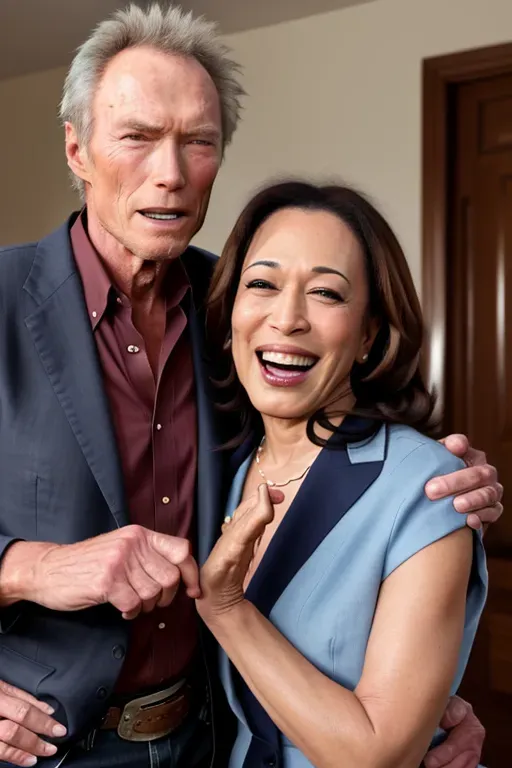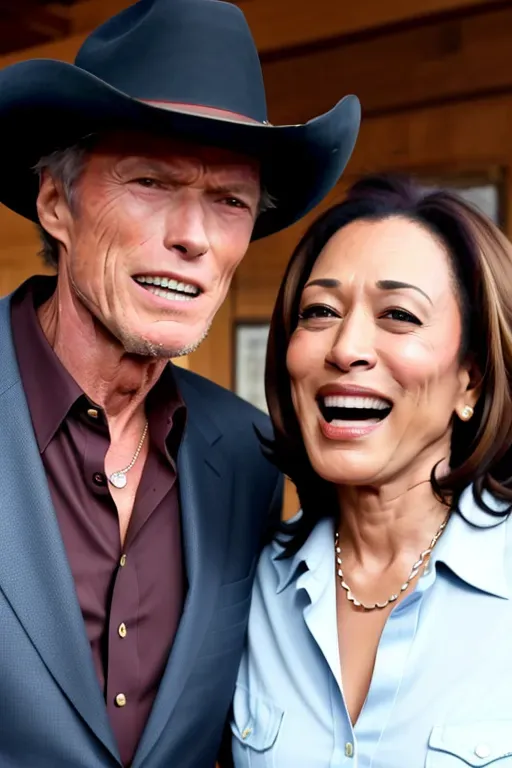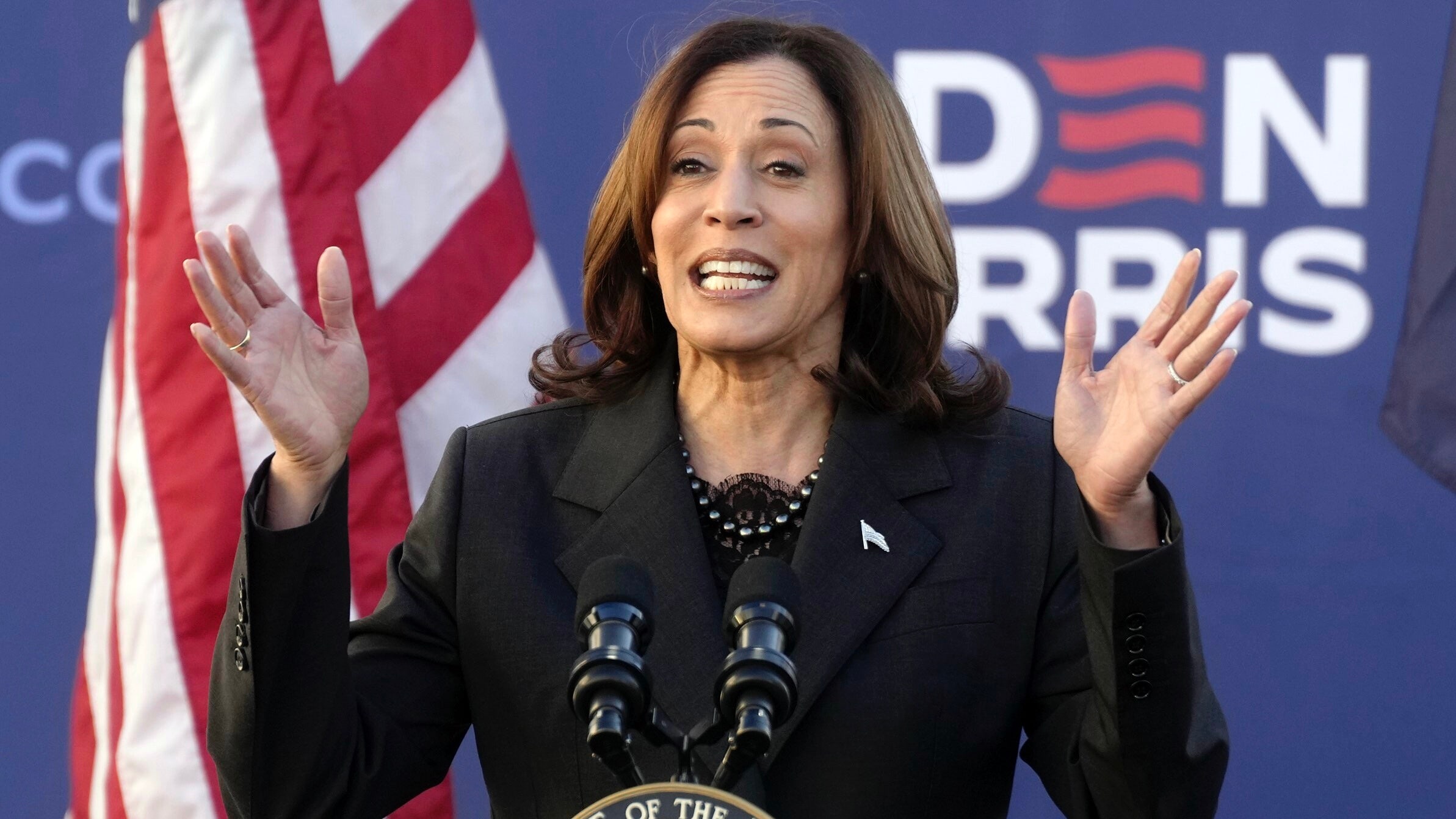Clint & Kamala: Surprising Connections - Hollywood Meets Politics!
Can the glitz and glamour of Hollywood ever truly reflect the stark realities of political power? The seemingly disparate worlds of Clint Eastwood and Kamala Harris surprisingly converge, revealing the intricate tapestry of American identity and highlighting the fascinating intersections between the entertainment industry and the political arena.
In the expansive landscape of American culture, certain names resonate with an almost mythical quality. Clint Eastwood and Kamala Harris are two such figures, each representing distinct yet compelling facets of the American story. Eastwood, the quintessential actor and filmmaker, embodies a rugged individualism and a cinematic legacy that has spanned decades, shaping the very image of the American hero. Harris, on the other hand, stands as a trailblazer in the political realm, etching her name in history as the first female Vice President of the United States, a potent symbol of progress and the nation's evolving demographics.
These two individuals, though operating in seemingly different spheres, have undeniably left their mark on public perception and have significantly influenced the cultural narrative of the nation. Their contributions, whether through the captivating lens of a camera or the influential platform of political office, have resonated deeply with the American populace. From Eastwood's early roles that defined a generation to his directorial masterpieces that explored the complexities of human nature, and from Harris's determined ascent through the legal and political systems to her current position of power, their lives offer a fascinating glimpse into the ever-changing landscape of the United States.
- Filmywap Co Kostenlose Filme Die Wahrheit Ber Risiken Alternativen
- Billie Eilish Die Schattenseite Von Rule 34 Was Steckt Dahinter
| Characteristic | Clint Eastwood | Kamala Harris |
|---|---|---|
| Full Name | Clinton "Clint" Eastwood Jr. | Kamala Devi Harris |
| Born | May 31, 1930 (Age 93) San Francisco, California, U.S. | October 20, 1964 (Age 59) Oakland, California, U.S. |
| Profession | Actor, Film Director, Producer, Composer | Politician, Attorney |
| Notable Work/Achievements |
|
|
| Political Affiliation | Republican (Historically) | Democrat |
| Known For |
|
|
| Website Reference | Britannica - Clint Eastwood | White House - Kamala Harris |
Clint Eastwood's ascent to becoming a cultural icon began in the mid-1950s, a pivotal moment marked by his signing a contract with Universal Pictures. From these relatively modest beginnings, Eastwood embarked on a relentless climb through the ranks of Hollywood, steadily honing his craft and captivating audiences with his distinctive presence. His filmography stands as a powerful testament to his enduring appeal, showcasing an impressive 46 starring roles and an additional 11 appearances where he graced the screen with memorable cameos. Beyond his acting prowess, Eastwood has also demonstrated remarkable talent behind the camera, directing 25 films and producing 20. These figures not only highlight his multifaceted artistic abilities but also underscore his significant contributions to the overall filmmaking process, solidifying his status as a true visionary in the industry.
Kamala Harris, conversely, embodies a different form of ascent, one rooted in the rigorous world of law and politics. As a prominent and influential figure within the Democratic Party, she has spearheaded numerous campaigns, demonstrating her strategic acumen and unwavering commitment to her political ideals. Notably, she selected Tim Walz, the current Governor of Minnesota, as her vice presidential running mate, a decision that underscored her focus on experience and shared policy goals. Harris's career trajectory, marked by her transition from a dedicated attorney to a seasoned politician, has been characterized by her relentless efforts to break down barriers and challenge established conventions. Her current role as the Vice President of the United States places her at the very epicenter of American political discourse, where her voice carries immense weight and her actions have far-reaching consequences.
The question of whether Clint Eastwood, a figure of such cultural significance, publicly supports Kamala Harris has ignited considerable curiosity and speculation. Eastwood, known for his long and illustrious career in Hollywood, has often maintained a degree of reticence when it comes to explicitly sharing his specific political endorsements. This tendency has fueled speculation, particularly given his historical affiliations with the Republican Party, a political landscape that often stands in contrast to Harris's Democratic ideals. The absence of a clear and definitive endorsement from Eastwood has left the public to interpret his views based on his past statements, his filmography, and his overall public persona, adding another layer of complexity to the discussion of political endorsements in the entertainment industry.
- Erome Mehr Als Nur Freie Inhalte Ein Tiefer Einblick
- Die Jenningssaga Eine Familiengeschichte Voller Musik Und Vermchtnis
Examining the intricate intersection of cinema and political discourse in America reveals a landscape where celebrity endorsements can wield significant influence, potentially swaying public opinion and shaping the national conversation. Eastwood, a figure of immense cultural weight and undeniable star power, has long been subject to intense scrutiny regarding his political leanings. In a world where public opinion can be easily swayed by prominent figures, the endorsement of an individual like Eastwood, with his vast reach and enduring appeal, could have a noteworthy impact on political campaigns and the overall political climate.
The interplay between these two iconic figures, despite their seemingly disparate domains, offers a unique and insightful lens through which to view the multifaceted American identity. Eastwood's films often delve into profound themes of justice, individualism, and the enduring spirit of the American West, capturing the essence of the nation's historical narrative and its ongoing struggle with moral complexities. Conversely, Harris stands at the forefront of advocating for social change and equality, championing progressive policies and striving to create a more inclusive and equitable society for all Americans. Both figures, in their own distinct ways, have become powerful symbols of their respective eras, embodying the hopes, aspirations, and challenges that have shaped the American experience.
The juxtaposition of Eastwood and Harris serves to highlight the dynamic ways in which American culture has been shaped and continues to evolve. Eastwood, the quintessential icon of Hollywood, has indelibly etched his mark on the film industry, leaving a lasting legacy that spans over six decades. His contributions have not only entertained audiences worldwide but have also influenced the very way Americans perceive themselves and their place in the world. Harris, a pivotal figure in American politics and culture, represents a significant shift in the power dynamics of the nation, breaking down barriers and paving the way for future generations of women and minorities to achieve positions of leadership and influence.
In a memorable column, the renowned San Francisco Chronicle columnist Herb Caen recounted an amusing anecdote in which Eastwood was present at a social gathering and inadvertently spilled champagne on Kamala Harris. This chance encounter, though seemingly trivial, serves as a symbolic intersection of their respective worlds, highlighting the blurring lines between the glitz and glamour of Hollywood and the serious business of Washington, D.C., where power and influence often collide.
The connection between Eastwood and Harris also raises profound questions about the ever-evolving relationship between art and politics. Eastwood, throughout his illustrious career, has demonstrated a long-standing interest in the political landscape, and his films often serve as a reflection of his personal philosophies and his nuanced understanding of the complexities of American society. Harris, as a prominent politician, operates in a realm where her actions are constantly scrutinized and her words carry immense weight, shaping policy and influencing public opinion on a daily basis. Both figures, in their own unique and impactful ways, have consistently contributed to the ongoing national conversation, challenging perspectives and pushing the boundaries of conventional thinking.
As we delve deeper into the lives of both Eastwood and Harris, it becomes increasingly essential to identify the underlying connections that bind these seemingly disparate figures together. Is it their shared ability to challenge societal norms and push the boundaries of established conventions? Or perhaps it is their unwavering dedication to their respective crafts, a commitment that has driven them to excel in their chosen fields and leave an enduring legacy for generations to come? Both Eastwood and Harris have been pivotal in challenging norms and redefining the boundaries of their respective domains, demonstrating a remarkable capacity for innovation and a relentless pursuit of excellence.
It is also worth noting the significant impact that celebrity endorsements can have on swaying public opinion and influencing voter behavior, as evidenced by the ongoing scrutiny into Eastwood's political preferences and the potential influence his support, or lack thereof, could have on various political campaigns. This dynamic adds yet another layer of complexity to the ongoing conversation about the intricate intersections between the world of film and the realm of politics in America, highlighting the power and responsibility that come with public recognition and influence.
Beyond the individual narratives, the intertwining of their stories illuminates the broader themes of ambition, perseverance, and the ever-changing landscape of American identity. Eastwood, through his iconic roles and directorial vision, has captured the spirit of rugged individualism and the allure of the American West, while Harris has shattered barriers and paved the way for future generations of women and minorities in positions of power. Their journeys, though distinct, speak to the diverse and dynamic nature of the American dream.
Eastwood's influence extends beyond the silver screen. His political views, often expressed subtly through his films, have sparked countless debates and discussions. Whether portraying a lone lawman fighting for justice or a grizzled veteran grappling with the complexities of war, Eastwood's characters often embody a sense of moral ambiguity that resonates with audiences across the political spectrum. This nuanced approach to storytelling has solidified his reputation as a filmmaker who dares to challenge conventional narratives.
Harris, on the other hand, has navigated the treacherous waters of American politics with a strategic mind and an unwavering commitment to her ideals. Her rise through the ranks of the Democratic Party is a testament to her political acumen and her ability to connect with voters from diverse backgrounds. As Vice President, she has played a key role in shaping policy and advocating for the Biden administration's agenda.
The speculation surrounding Eastwood's potential support for Harris highlights the enduring power of celebrity endorsements in American politics. While Eastwood has remained largely silent on the matter, his past affiliations with the Republican Party have led many to believe that he would be unlikely to publicly endorse a Democratic candidate. However, Eastwood's independent streak and his willingness to challenge conventional wisdom make it difficult to predict his political leanings with certainty.
Regardless of Eastwood's personal views, the fact that his potential endorsement is even a topic of discussion underscores the blurring lines between Hollywood and Washington, D.C. In an era of celebrity activism and social media influence, the opinions of actors, musicians, and other cultural figures can carry significant weight, shaping public discourse and influencing political outcomes.
The contrasting backgrounds and career paths of Eastwood and Harris offer a fascinating glimpse into the complexities of American society. Eastwood, the self-made movie star who rose to fame through hard work and determination, represents the enduring appeal of the American dream. Harris, the daughter of immigrants who shattered barriers and achieved the highest office in the land, embodies the promise of opportunity and the potential for progress.
Ultimately, the connection between Eastwood and Harris is not about their personal relationship or their political affiliations. It is about the way they both reflect and shape the American identity. Through their work, they have challenged our perceptions, sparked important conversations, and contributed to the ongoing narrative of a nation in constant evolution.
Their impact on American culture is undeniable. Eastwood's films have entertained and inspired generations, while Harris has paved the way for future generations of women and minorities in politics. Their stories serve as a reminder that the American dream is still alive and well, and that anything is possible with hard work, dedication, and a willingness to challenge the status quo.
The accidental champagne spill, as recounted by Herb Caen, is a fitting metaphor for the unpredictable and often surprising intersections between Hollywood and Washington. It is a reminder that even in the most disparate worlds, there are moments of connection and common ground.
Eastwood's ability to infuse his films with political undertones speaks to the power of art as a form of social commentary. His willingness to tackle controversial issues and challenge conventional wisdom has made him a respected and influential voice in American culture.
Harris's position as Vice President places her at the center of American political discourse, where her every word and action is scrutinized. Her ability to navigate the complexities of the political landscape and advocate for her policies is a testament to her skills and her unwavering commitment to her ideals.
The question of what connects Eastwood and Harris ultimately boils down to their ability to challenge societal norms and redefine the boundaries of their respective fields. Both figures have defied expectations and achieved remarkable success, inspiring others to follow in their footsteps.
The scrutiny surrounding Eastwood's political preferences underscores the significant influence that celebrity endorsements can have on public opinion and voter behavior. In an era of social media and instant communication, the voices of celebrities can reach millions of people and shape the political landscape.
This exploration of the lives of Eastwood and Harris provides valuable insights into the philosophies, careers, and cultural significance of these two prominent figures in contemporary America. By examining their biographies, philosophies, and public personas, we gain a deeper understanding of the complex interplay between cinema and political discourse. We see how their contributions have shaped the American identity and its evolving narrative, reflecting a nation in constant evolution, where art and politics frequently intersect, influencing each other in profound ways. Their stories offer invaluable lessons about the power of individual agency, the importance of challenging conventional wisdom, and the enduring allure of the American dream.
Delving further into their individual philosophies reveals even more fascinating connections. Eastwood's libertarian leanings, often reflected in his films, emphasize personal responsibility and limited government intervention. Harris, a progressive Democrat, advocates for social justice and government programs that address inequality. While their political ideologies may differ, both share a belief in the importance of individual freedom and the pursuit of a better future.
Eastwood's directorial choices often reflect his skepticism towards authority and his admiration for those who stand up against injustice. His films frequently explore the complexities of morality, challenging viewers to question their own beliefs and assumptions.
Harris's legal background has shaped her approach to politics, emphasizing the importance of due process and the rule of law. Her experience as a prosecutor and Attorney General has given her a unique perspective on the challenges facing the criminal justice system.
The public personas of Eastwood and Harris have been carefully crafted over the years. Eastwood, the stoic and enigmatic movie star, has cultivated an image of rugged individualism and quiet strength. Harris, the charismatic and articulate politician, has projected an image of competence and compassion.
Their contrasting styles have resonated with different segments of the American population. Eastwood's appeal transcends generational divides, while Harris has inspired a new generation of young people to become involved in politics.
The ongoing debate over Eastwood's political views highlights the challenges of separating an artist's work from their personal beliefs. Some argue that Eastwood's films should be judged solely on their artistic merits, while others believe that his political leanings inevitably influence his creative choices.
Similarly, Harris's political positions are often scrutinized and debated, particularly in a highly polarized political climate. Her supporters admire her commitment to progressive values, while her critics question her policies and her effectiveness as a leader.
The legacies of Eastwood and Harris will continue to be debated and re-evaluated for years to come. Their contributions to American culture and politics are undeniable, and their stories will continue to inspire and challenge future generations.
The interplay between their lives and careers provides a valuable lens through which to examine the complexities of American identity and the ever-evolving relationship between art and politics. Their journeys serve as a reminder that the American story is a multifaceted and dynamic one, shaped by the contributions of individuals from all walks of life.
In conclusion, the lives of Clint Eastwood and Kamala Harris, though seemingly worlds apart, are inextricably linked by the shared experience of shaping and reflecting the American identity. Their stories offer a compelling glimpse into the dynamic interplay between cinema and political discourse, highlighting the power of art to challenge perceptions and the responsibility of leaders to advocate for change. As America continues to evolve, the legacies of Eastwood and Harris will undoubtedly continue to inspire and provoke, reminding us of the enduring power of the American dream and the ongoing quest for a more just and equitable society.
- Iuiu Uiu Vpnsicherheit Uninews Und Onlinegefahren
- Online Comics Eine Grenzenlose Welt Der Geschichten Mehr

Dopamine Girl A 8k high resolution photo of, Clint Eastwood dressed as a cowboy smoking a

Dopamine Girl A 8k high resolution photo of, Clint Eastwood dressed as a cowboy smoking a

Clint Eastwood Kamala Harris A Fascinating Intersection Of Politics And Pop Culture